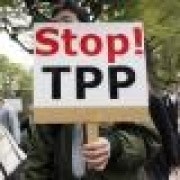Protectionism by consent: the Trans-Pacific Partnership Agreement
With one exception, the Trans-Pacific Partnership Agreement (TPPA) negotiations have been locked behind an iron curtain of secrecy. The curtain just got a bit less opaque.
The recent publication by Wikileaks of a leaked, recently dated, draft of the Intellectual Property chapter was a break-through in terms of public enlightenment. It also rang the IP industry alarm. Make no mistake: the TPPA, if agreed, will touch most things in domestic and professional life right down to better pain relief or selecting a wine by region.
There is a lot to be concerned about in the draft, but identifying specific likely outcomes is difficult because the wording of so many clauses is, as yet, unresolved. However, the leaked document does clearly identify the preferred wordings of the disparate parties.
The draft also allows for some judgement about who is in bed with whom over issues like the further extension of copy and patent rights, what amounts to fair and legal processes for remedies of rights’ breaches, regional locks and how internet service providers (ISP) should be regulated.
It’s pretty clear that Australia and the United States are a bit more than kissing cousins.
Strangely, Australia’s negotiating position over the responsibility of ISPs for the carriage of pirated material is at odds with the legal position in Australia, established by the judgment in the iiNet case. And then there’s the High Court’s decision that Australians have a right to break regional locks. The negotiators seem to have forgotten that too.
Are they acting under instruction or are they deceiving government? The secrecy of the negotiations ensures that all three are possible.
Why copyright?
One overarching observation is clear: the negotiators and their political masters have lost sight of the original purpose of copyrights and patent rights. Instead of patent and copyrights being a means to an end (or, really, two principal ends), the ownership and control of patent and copyrights has become an end in itself.
Copyrights and patents are not there to gold plate rights-holders grandchildren's retirement funds. They are there to reward the innovators and creators for their work, and then, after a reasonable time, ensure their work enters the public domain as feed stock for further innovation and creation.
Patents and copyrights support innovation. Locking up the rights well beyond the life of the creator, or the date of first publication of the work, strikes at those very endeavours.
It is the new protectionism. Every creator or innovators is in the position that the enlightenment scientist and philosopher, Isaac Newton put so well: ‘If I have seen further it is by standing on the shoulders of giants’.
It seems that, today, the giants don’t want anyone standing on their shoulders, they don’t want anybody to see further than them.
Thus the TPPA’s IP chapter seeks to further extend copyright from the 70 years that the US government chose to protect the interests of the Disney company as their much loved and very profitable Mickey Mouse character was about to enter the public domain.
Some countries support more than 100 years of exclusive copyright. So if patents or copyrights expire after 50 years then expiring after 100 years is twice as good. Right? But for whom?
In this chapter of the TPPA, rich and powerful countries are trying to protect the interests of once inventive companies and individuals who have run out of ideas but are still very good at the politics of protection.
This treaty is anti-innovation and the dog in the manger attitude will fence-in the innovators of the 21st century, especially in emerging economies, to protect domestic revenue streams of the legacy economies.
Defence of copyright
A significant part of the IP chapter is given to mechanisms to prosecute copyright violations. Piracy of films and music, as the story of 100 Bloody Acres illustrates, is sapping the production of independent cinema and music. Australian production will always be dependent on the good will of governments for most of their finance if measures are not taken against piracy.
But the approach employed in the IP chapter is all stick and no carrot.
In addition, the complexities created by the chapter will support only specialised litigation agents. Since some multinational companies have legal department larger than the legal bureaucracies of developing nations, it is easy to see who loses if an alleged copyright infringement goes to court. And there are other compliance costs as well.
Copyright needs public education more than it needs additional avenues of prosecution. This is boarding up the old shop windows when a new model of business is the answer.
The proposed TPPA will further set in stone the dramatic imbalance in the trade in intellectual property that immensely favours the USA. The IP chapter of the TPPA will ensure that imbalance continues indefinitely. The agreement will restrain newly developing economies from innovation and creation in intellectual property.
Being a smart country is now permanently off the agenda for most signatories of the proposed agreement.
Dr Vincent O'Donnell is the media policy editor at Screen Hub and an executive producer at Arts Alive. This article is an edited version of an article first published in Screen Hub.
















